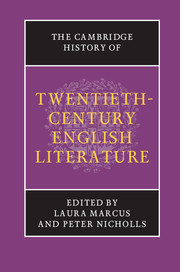Book contents
- Frontmatter
- Introduction
- PART ONE WRITING MODERNITY
- PART TWO THE EMERGING AVANT-GARDE
- PART THREE MODERNISM AND ITS AFTERMATH, 1918–1945
- PART FOUR POST-WAR CULTURES, 1945–1970
- 25 Culture, class and education
- 26 Post-war broadcast drama
- 27 Drama and the new theatre companies
- 28 Modernism and anti-Modernism in British poetry
- 29 Nation, region, place: devolving cultures
- 30 The sixties: realism and experiment
- 31 ‘Voyaging in’: colonialism and migration
- PART FIVE TOWARDS THE MILLENNIUM, 1970–2000
- Bibliography
- Index
- References
26 - Post-war broadcast drama
from PART FOUR - POST-WAR CULTURES, 1945–1970
Published online by Cambridge University Press: 28 March 2008
- Frontmatter
- Introduction
- PART ONE WRITING MODERNITY
- PART TWO THE EMERGING AVANT-GARDE
- PART THREE MODERNISM AND ITS AFTERMATH, 1918–1945
- PART FOUR POST-WAR CULTURES, 1945–1970
- 25 Culture, class and education
- 26 Post-war broadcast drama
- 27 Drama and the new theatre companies
- 28 Modernism and anti-Modernism in British poetry
- 29 Nation, region, place: devolving cultures
- 30 The sixties: realism and experiment
- 31 ‘Voyaging in’: colonialism and migration
- PART FIVE TOWARDS THE MILLENNIUM, 1970–2000
- Bibliography
- Index
- References
Summary
Broadcasting was just as responsible as cinema, if not more so, for opening up the established theatrical tradition to mass audiences, firstly on radio as what J. C. Trewin dubbed ‘the National Theatre of the Air’, then on television as potentially ‘The Largest Theatre in the World’, in Shaun Sutton’s famous phrase. Simultaneously, drama also underwent its own radical transformation within these new media. They served not just to revitalise older genres, but to open genuinely new creative possibilities for dramatic form. It is the leading contours of such innovations and their evolving social and cultural significance which this essay endeavours to sketch.
By 1945 BBC radio had built up a listenership with the necessary habits and skills to broadcast some four hundred plays annually, in addition to ‘microphone serials’, Dick Barton Special Agent becoming the most popular. Of broadcast genres, serialisation and the series are arguably the most distinctive, with television developing radio’s pattern. Radio’s principal narrative and ‘textural’ techniques, genres and methods were pioneered in pre-war drama and features by ‘producer–directors’ and writers such as Lance Sieveking, Tyrone Guthrie, Olive Shapley and D. G. Bridson. These developed a ‘radiophonic’ space–time fluidity comparable to cinema’s, through montage, association or superimposition of acoustic images, by fade-ups/outs, ‘dissolves’ and so on, cross-cutting between locations for simultaneity and dramatic contrast, breaking down conventional scenes into ‘shots’, ‘zooms’ and ‘close-ups’. Radio’s ‘basic grammar’ borrowed terminology from film, music and psychology as much as the stage.
- Type
- Chapter
- Information
- The Cambridge History of Twentieth-Century English Literature , pp. 474 - 493Publisher: Cambridge University PressPrint publication year: 2005

